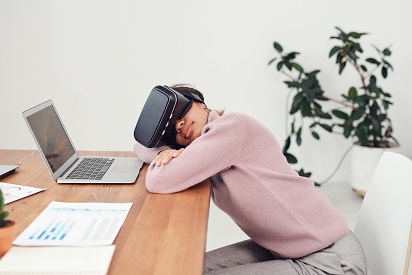Virtual Reality
A Survey of Use at an Academic Library
DOI:
https://doi.org/10.6017/ital.v39i1.11369Abstract
We conducted a survey to inform the expansion of a Virtual Reality (VR) service in our library. The survey assessed user experience, demographics, academic interests in VR, and methods of discovery. Currently our institution offers one HTC Vive VR system that can be reserved and used by patrons within the library, but we would like to expand the service to meet the interests and needs of our patrons. We found use among all measured demographics and sufficient patron interest for us to justify expansion of our current services. The data resulting from this survey and the subsequent focus groups can be used to inform other academic libraries exploring or developing similar VR services.
References
Adetoun A Oyelude, “Virtual and Augmented Reality in Libraries and the Education Sector,” Library Hi Tech News 34, no. 4 (2017): 3, https://doi.org/10.1108/LHTN-04-2017-0019.
Bruce Massis, “Using Virtual and Augmented Reality in the Library,” New Library World 116, nos. 11-12 (2015): 789, https://doi.org/10.1108/NLW-08-2015-0054.
Del Siegle, “Seeing is Believing: Using Virtual and Augmented Reality to Enhance Student Learning,” Gifted Child Today 42, no. 1 (2019): 46, https://doi.org/10.1177/1076217518804854.
Elizabeth Dyer, Barbara J. Swartzlander, and Marilyn R. Gugliucci, “Using Virtual Reality in Medical Education to Teach Empathy,” Journal of the Medical Library Association: JMLA 106, no. 4 (2018): 498, https://doi.org/10.5195/jmla.2018.518.
Emilio Madrigal, Shyam Prajapati, and Juan Hernandez-Prera, “Introducing a Virtual Reality Experience in Anatomic Pathology Education,” American Journal of Clinical Pathology 146, no. 4 (2016): 462, https://doi.org/10.1093/ajcp/aqw133
Guillaume Loup et al., “Immersion and Persistence: Improving Learners’ Engagement in Authentic Learning Situations,” 11th European Conference on Technical Enhanced Learning (2016): 414, https://doi.org/10.1007/978-3-319-45153-4_35
Hannah Pope, “Incorporating Virtual and Augmented Reality in Libraries,” Library Technology Reports 54, no. 6 (2018): 8.
“The iSchool Technology Resources at FSU: Virtual Reality,” Florida State University LibGuides, https://guides.lib.fsu.edu/iSchoolTech/VR.
Leanna Fry Balci, “Using Augmented Reality to Engage Students in the Library,” Information Today Europe/ILI365 (November 17, 2017), https://www.infotoday.eu/Articles/Editorial/Featured-Articles/Using-Augmented-Reality-to-engage-students-in-the-library-121763.aspx.
Mariano Alcaniz, Elena Olmos-Raya, and Luis Abad, “Use of Virtual Reality for Neurodevelopmental Disorders: A Review of the State of the Art and Future Agenda,” Medicina-Buenos Aires 79, nos. 77–81 (2019): 419-20, https://doi.org/10.21565/ozelegitimdergisi.448322.
Medhat Alaker, Greg R. Wynn, and Tan Arulampalam, “Virtual Reality Training in Laparoscopic Surgery: A Systematic Review & Meta-Analysis,” International Journal of Surgery 29 (2016): 86, https://doi.org/10.1016/j.ijsu.2016.03.034.
“Media Lab,” Massachusetts Institute of Technology, https://libraries.psu.edu/services/virtual-reality-services
Negin Dahya et al., “Virtual Reality in Public Libraries,” University of Washington Information School, https://ischool.uw.edu/vrinlibraries.
Nils Fredrik Kleven et al., “Training Nurses and Educating the Public Using a Virtual Operating Room with Oculus Rift,” IEEE (2014): 1, https://doi.org/10.1109/VSMM.2014.7136687.
“Oxford LibGuides: Virtual Reality: Borrowing VR Equipment,” Bodleian Libraries, https://ox.libguides.com/vr/borrowing
Patricia Brown, “How to Transform Your Classroom with Augmented Reality—EdSurge News,” Edsurge, November 2, 2015, https://www.edsurge.com/news/2015-11-02-how-to-transform-your-classroom-with-augmented-reality.
Paul Milgram et al., “Augmented Reality: A Class of Displays on the Reality-Virtuality Continuum,” in Telemanipulator and Telepresence Technologies 2351 (International Society for Optics and Photonics, 1995), 282-92.
Robert Carini, George Kuh, and Stephen Klein, “Student Engagement and Student Learning: Testing the Linkages,” Research in Higher Education 47, no. 1 (2006): 23-4, https://doi.org/10.1007/s11162-005-8150-9.
Sarah Howard, Kevin Serpanchy, and Kim Lewin, “Virtual Reality Content for Higher Education Curriculum,” Proceedings of VALA (Melbourne, Australia: Libraries, Technology and the Future Inc., 2018), 2.
Susan Lessick and Michelle Kraft, “Facing Reality: The Growth of Virtual Reality and Health Sciences Libraries,” Journal of the Medical Library Association: JMLA 105, no. 4 (2017): 407.
“Virtual Reality Services,” Penn State University Libraries, https://libraries.psu.edu/services/virtual-reality-services
“VR Studio,” North Carolina State, https://www.lib.ncsu.edu/spaces/vr-studio.
Wadee Alhalabi, “Virtual Reality Systems Enhance Students’ Achievements in Engineering Education,” Behaviour & Information Technology 35, no. 11 (2016): 925, https://doi.org/10.1080/0144929X.2016.1212931.
Weina Wang, Kelly Kimberley, and Fangmin Wang, “Meeting the Needs of Post-Millennial: Lending Hot Devices Enables Innovative Library Services,” Computers in Libraries (April 2017): 7.
Yazhou Huang, Lloyd Churches, and Brendan Reilly, “A Case Study on Virtual Reality American Football Training,” Proceedings of the 2015 Virtual Reality International Conference 6 (2015): 3, https://doi.org/10.1145/2806173.2806178.
Zois Koukopoulos and Dimitrios Koukopoulos, “Usage Scenarios and Evaluation of Augmented Reality and Social Services for Libraries,” in Digital Heritage. Progress in Cultural Heritage: Documentation, Preservation, and Protection (Springer International, 2018), 134-41

Downloads
Published
How to Cite
Issue
Section
License
Copyright (c) 2020 Megan Frost, Michael C. Goates, Sarah Cheng, and Jed Johnston

This work is licensed under a Creative Commons Attribution-NonCommercial 4.0 International License.
Authors that submit to Information Technology and Libraries agree to the Copyright Notice.

